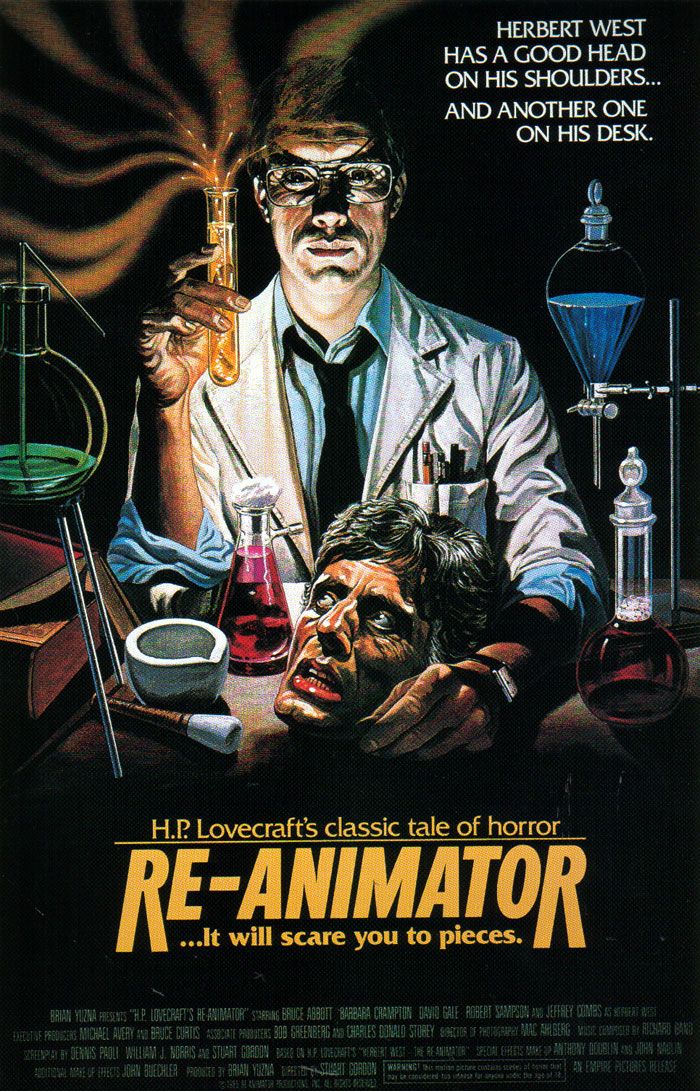|
Re-Animator Film review by Thomas M. Sipos |
|
MENU Books Horror Film Festivals and Awards
Pursuits
Blogs Horror Film Festivals and Awards
Other
|
Re-Animator (1985, dir: Stuart Gordon; pro: Brian Yuzna; scp: Dennis Paoli, William J. Norris, Stuart Gordon, based on six short stories by H.P. Lovecraft; cast: Jeffrey Combs, David Gale, Bruce Abbott, Barbara Crampton)
True, The Doctor and the Devils, like Scream (the 1996 film, not the 1973 or 1985 films of the same name) is arguably suspense rather than horror. However, both were marketed as horror and contain horror icons. There's no genre ambiguity with Re-Animator, which combined the new boundary-breaking gore of the cannibal zombie cycle with the more traditional mad scientist icon. Based on a six story series by H.P. Lovecraft, Re-Animator is a retelling of the Frankenstein legend. The stories feature a loner/mad scientist, Herbert West, and his monomaniacal attempts to re-animate the dead. Each re-animation presents unforeseen problems, forcing West to try again with ever fresher corpses. These simple tales still hold up today, aside from Lovecraft's dated disparaging remarks about blacks and ethnic immigrants. Re-Animator updates the stories, placing events in a contemporary version of Lovecraft's Miskatonic University. Disparagements are removed. New characters are introduced, along with romantic conflicts to keep them busy. West remains the monomaniacal loner. Re-Animator's script is structurally superb, establishing a delicate balance between good and evil, then introducing an amoral catalyst who draws everything crashing together. The good are the dedicated medical student Bruce Abbott, his secret fiancée Barbara Crampton, and her father, the upstanding Dean of Miskatonic University. Representing evil is the brilliant neurology professor played by David Gale, a plagiarist with covert kinky designs on Crampton.
The catalyst is a newly transferred medical student, Herbert West, played with quirky intensity by Jeffrey Combs. Arrogant and rude, intensely devoted to his work, amoral about the means to achieve it, Combs's performance proves him a stellar character actor (although it would be over a decade before he would receive a role as good as Herbert West -- as the kinkily paranoid FBI agent in The Frighteners). Despite his unpleasantness, Combs quickly insinuates himself into everyone's lives, challenging Gale's integrity and competence in class, and setting up a lab in Abbott's basement. He recruits Abbott despite the latter's misgivings, and soon all are enmeshed in Combs's experiments, voluntarily or not. Re-Animator is a short film (86 minutes), but its rapid pace covers much. Betrayals, blackmail, intrigue and counter-intrigue, zombie armies and talking heads and splatter aplenty, as Combs presses on to perfect his re-animation serum. Frenzied action and gruesome effects are complemented by a smart script with sharp lines. Threatened by a re-animated head, Combs retorts, "Who's gonna believe a talking head? Get a job in the sideshow." As in most horror films, villains outshine heroes. Jeffrey Combs and David Gale provide the standout performances. Barbara Crampton is attractive and sympathetic, but no more. Her character is good, and good people suffer in horror. Between suffering she wrings her hands with worry, much as Victoria Winters in Dark Shadows. Yes, Crampton has a nude scene, and she looks nice, but it's Gale who chews the scenery (I won't spoil it by saying how). Yet although Combs is the central figure and catalyst of events, Bruce Abbott's character is in a sense the more interesting if less charismatic. His character is the only one who changes, the film a record of his corruption and moral descent. Abbott is a caring medical student, going the extra mile to save his patients. But as the film progresses it turns out he is weak, susceptible to temptation and blackmail. Abbott is tempted by Combs, first by Combs's money, then by his experiments, wading ever deeper into darkness. Abbott yields when Combs threatens to inform the Dean about Abbott's affair with his daughter. In contrast, Combs devotion to his work is such that he refuses to give in to Gale's attempted blackmail. Combs is stronger than Abbott, and through threats and bribes, easily draws Abbott into areas of science best left untouched. Yet Abbott is complicit in his descent, repelled but also fascinated by Combs's work. Abbott evokes Basil Rathbone in Son of Frankenstein (1939), a good but weak man who allows himself to be tempted, threatened, and corrupted by a stronger, darker personality (the memory of his father, and to a lesser extent, Ygor). Crampton, a devoted daughter and forgiving fiancée, tries to keep Abbott on the righteous path. She senses the darkness in Combs and warns Abbott to avoid Combs. Abbott begins his descent when he dismisses her fears upon seeing Combs produce a wad of rent money. Abbott's descent bottoms out when he tries to regain what he lost (Crampton) using Combs's illicit methods. The final blackout underscores his folly.
Purely as a fast-paced zombie gorefest, Re-Animator delivers much entertainment. Its effects are visceral and imaginative. Dialogue is sharp and funny. Charles Band's musical score, a whimsical variation on Bernard Herrmann's Psycho theme, establishes early on that Re-Animator is intended to be both funny and horrific. It is, yet Abbott's moral struggle adds another dimension, setting him, like Rathbone, above many bland horror heroes. Abbott's love for Crampton is counter-balanced by the dark temptation of the re-animation serum, culminating in a final scene that blends poignancy, horror, and black comedy. Producer Brian Yuzna followed Re-Animator with From Beyond (1986). Although not a sequel, it was another Lovecraft adaptation directed by Stuart Gordon, again featuring Combs and Crampton. Combs played a more sympathetic (and less interesting) experimental subject to Crampton's kinky mad scientist. Bride of Re-Animator (1989) continued the Herbert West saga with Combs and Abbott, but added nothing new to be series. Daily Variety reported in October 2000 that Brian Yuzna was working on From Beyond Re-Animator, released in 2003 as Beyond Re-Animator. Review copyright by Thomas M. Sipos
|
"Communist Vampires" and "CommunistVampires.com" trademarks are currently unregistered, but pending registration upon need for protection against improper use. The idea of marketing these terms as a commodity is a protected idea under the Lanham Act. 15 U.S.C. s 1114(1) (1994) (defining a trademark infringement claim when the plaintiff has a registered mark); 15 U.S.C. s 1125(a) (1994) (defining an action for unfair competition in the context of trademark infringement when the plaintiff holds an unregistered mark).

 1985 was
a golden year for horror. First-rate, innovative, seminal horror
films don't come every year. 1985 saw the release of three:
1985 was
a golden year for horror. First-rate, innovative, seminal horror
films don't come every year. 1985 saw the release of three: 